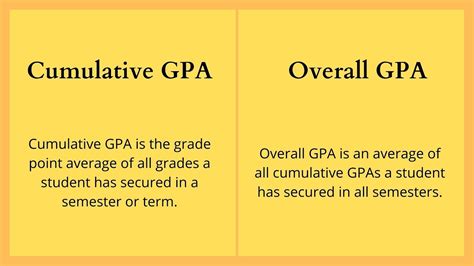When it comes to your academic record, your GPA (grade point average) and cumulative GPA are two important numbers. But what’s the difference between the two?

GPA is the average of all the grades you’ve earned in your coursework. It’s calculated by dividing the total number of grade points you’ve earned by the total number of credit hours you’ve taken.
Cumulative GPA is the average of all the grades you’ve earned in all of your coursework, including both high school and college. It’s calculated by dividing the total number of grade points you’ve earned by the total number of credit hours you’ve taken in all of your coursework.
So, what’s the difference? GPA is a measure of your academic performance in a specific period of time, such as a semester or a year. Cumulative GPA is a measure of your academic performance over your entire academic career.
Which one is more important?
Both GPA and cumulative GPA are important, but cumulative GPA is generally considered to be the more important of the two. This is because it provides a more complete picture of your academic performance over time.
Cumulative GPA is used by colleges and universities to make admissions decisions. It’s also used by employers to make hiring decisions.
How to improve your GPA and cumulative GPA
There are a few things you can do to improve your GPA and cumulative GPA:
- Study hard and get good grades. This is the most important thing you can do to improve your GPA.
- Take challenging courses. Taking challenging courses will help you boost your GPA.
- Get involved in extracurricular activities. Getting involved in extracurricular activities will help you develop time management skills and learn how to work with others.
- Don’t be afraid to ask for help. If you’re struggling in a class, don’t be afraid to ask your teacher or a tutor for help.
Common Mistakes to Avoid
When it comes to GPA and cumulative GPA, there are a few common mistakes to avoid:
- Don’t procrastinate. Procrastinating will only make it harder to get good grades.
- Don’t overload your schedule. Taking too many courses at once can make it difficult to succeed in all of them.
- Don’t be afraid to drop a course. If you’re struggling in a course, it’s better to drop it than to fail it.
- Don’t compare yourself to others. Everyone is different, and everyone learns at their own pace. Don’t compare yourself to others, and focus on your own progress.
FAQs
1. What is a good GPA?
A good GPA is generally considered to be 3.0 or higher.
2. What is a good cumulative GPA?
A good cumulative GPA is generally considered to be 3.5 or higher.
3. How can I calculate my GPA?
To calculate your GPA, divide the total number of grade points you’ve earned by the total number of credit hours you’ve taken.
4. How can I calculate my cumulative GPA?
To calculate your cumulative GPA, divide the total number of grade points you’ve earned in all of your coursework by the total number of credit hours you’ve taken in all of your coursework.
5. What is the difference between a weighted GPA and an unweighted GPA?
A weighted GPA is a GPA that takes into account the difficulty of the courses you’ve taken. An unweighted GPA is a GPA that does not take into account the difficulty of the courses you’ve taken.
6. What is the difference between a major GPA and a minor GPA?
A major GPA is a GPA that includes only the grades you’ve earned in the courses required for your major. A minor GPA is a GPA that includes only the grades you’ve earned in the courses required for your minor.
Conclusion
GPA and cumulative GPA are two important numbers that can have a significant impact on your future. By understanding the difference between the two, you can make informed decisions about your academic career.
